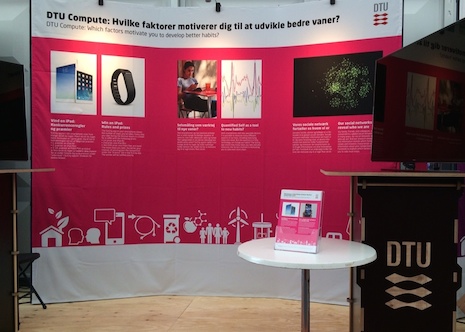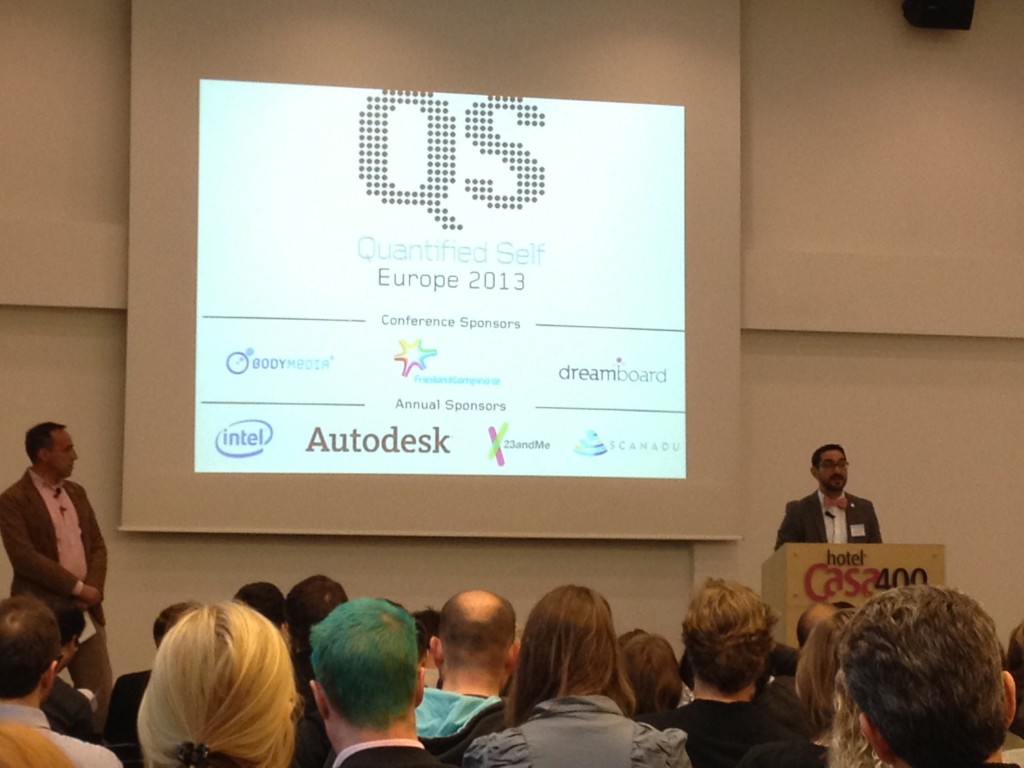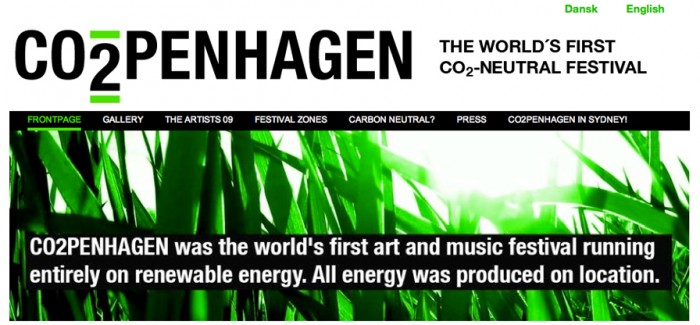Simon Due Kamronn joins the lab as a PhD student in the Cognitive Systems Section at DTU Compute under my supervision and co-supervised by Lars Kai Hansen. Simon will work on 24/7 monitoring of physical activity and energy expenditure in everyday life activities using smartphones and wearable sensors. The project is part of an ongoing research project in collaboration with University of Copenhagen in part funded by TrygFonden. The working title of the PhD project is Monitoring and Modeling of Behavioural Changes using Smartphone and Wearable Sensing. Welcome, Simon!
Tag Archives: research
ESOF 2014 – Science in the City
This week we are showcasing our research in Quantified Self and Network Science at the EuroScience Open Forum 2014 (ESOF) Science in the City festival. Our tagline is: Which factors motivate you to take more steps?
With smartphones and new wearable devices it is possible to measure many different aspects of our lives, including exercising, sleep and mood. But the question is if this technology can change our habits?

Our team from DTU Compute uses Science in the City as the foundation for a scientific study – and we use the official SciCity app to do this. We have included a step counter feature in the app and use the app to study the factors that motivate to take more steps. Our study is based on the two exciting scientific fields: Quantified Self and Network Science.
Quantified Self addressing how self-monitoring (for instance apps on smartphones or wearable gadgets) influence our self-perception and Network Science studying the mathematics that describes structure and dynamics in our social networks. Via family, friends, and colleagues, we’re connected to a global social network. In many ways, our social networks show who we are. And our research shows that this information reveals which fundamental values and interests characterize us. We use information about the connections on, e.g. Facebook to explore which factors motivate the user to take more steps.
Per Bækgaard new PhD student
Per Bækgaard joins the lab as a new PhD student in the Cognitive Systems Section at DTU Compute under my supervision and co-supervised by Michael Kai Petersen. Per will work on the Eye Tracking for Mobile Devices project. The working title of the PhD project is Enhancing User Experience on Next Generation Mobile Devices by Combining Eye Tracking with Biometric Data. Welcome, Per!
Andrea Cuttone new PhD student
Andrea Cuttone joins the lab as a new PhD student in the Cognitive Systems Section at DTU Compute under my supervision and co-supervised by Sune Lehmann. Andrea will work in part on the Sensible DTU project and use that as an experimental platform for his PhD project. The working title of the PhD project is Data mining and visualization tools for human behavior data. Welcome, Andrea!
TEDx Talk: Human Data for Life
My TEDx talk entitled Human Data for Life from the recent TEDxCopenhagenSalon event is available.
Over the last couple of years self-tracking has gained increased interest with the availability of smartphones and low-cost wearable sensors. The increasing quantities of data that we can capture about human behavior and interactions are key to future improvements in health and well-being.
Crowds, Bluetooth and Rock’n’Roll: Understanding Music Festival Participant Behavior
Our paper on Crowds, Bluetooth and Rock’n’Roll: Understanding Music Festival Participant Behavior is available in arXiv. At a large music festival (8 days and 130,000+ participants) we applied Bluetooth sensing to discover Bluetooth-enabled mobile phones carried by the participants, which enabled us to observe patterns of behavior in terms of participant mobility and offline social interaction. An overall summary of the mobility data collected during the 8 day festival is shown below.

A nice popular summary of the article was made by MIT Technology Review in Music Festivals, Bluetooth Monitoring and the Behavior of Crowds.
Quantified Self Conference 2013 in Amsterdam
As part of my participation in the fourth Quantified Self Conference I chaired a breakout session on QS Research where I motivated the discussion by presenting some of our ongoing research, including the Smartphone Brain Scanner and the Sensible DTU project. There is a growing interest and increasing number of researchers and scholars participate in the QS conferences, which was apparent from our breakout room being completely full.

Grant from H. C. Ørsted Foundation
We have received a grant from the H. C. Ørsted Foundation (in danish: H. C. Ørsteds Fond for Teknisk-Videnskabelige undersøgelser) to support our research in human behavior and mobility modeling using smartphones and wearable sensors.
Affective Computing and Intelligent Interaction (ACII 2011)
We are presenting two research papers and a demo of our smartphone brain scanner at the Affective Computing and Intelligent Interaction (ACII2011) conference in Memphis, Tennessee on October 9 to 12, 2011.

Presentation at the MeeGo 2011 conference
![]() At the recent MeeGo 2011 conference Arek Stopczynski and I gave a well received presentation on ‘Mobile Platforms in Research and Teaching’, where we gave a set of specific examples of research projects that have included prototyping on high-end smartphone/tablet devices.
At the recent MeeGo 2011 conference Arek Stopczynski and I gave a well received presentation on ‘Mobile Platforms in Research and Teaching’, where we gave a set of specific examples of research projects that have included prototyping on high-end smartphone/tablet devices.
The online Prezi presentation is available here.
New Scientist: Sensational festival music, from your cellphone
 ‘Sound quality at open-air concerts can be disappointing. Now a smartphone app promises to put an end to tinny vocals‘. An article “Sensational festival music, from your cellphone” in New Scientist issue 2800 p. 23 on Feb. 19, 2011 describes our recent work on Augmenting the sound experience at music festivals using mobile phones (the research paper is available at the ACM Portal).
‘Sound quality at open-air concerts can be disappointing. Now a smartphone app promises to put an end to tinny vocals‘. An article “Sensational festival music, from your cellphone” in New Scientist issue 2800 p. 23 on Feb. 19, 2011 describes our recent work on Augmenting the sound experience at music festivals using mobile phones (the research paper is available at the ACM Portal).
The project is carried out by DTU Informatics, CrossOverGlobal, and Rhode & Schwarz and is aDanish Sound Technology Network’s innovation project. The scientific work was presented at the15th international conference on Intelligent user interfaces (IUI2011) by Jakob Eg Larsen and Arkadiusz Stopczynski, DTU Informatics, including the technical issues in augmenting the sound experience using mobile phones as well as results from experiments carried out at two concerts at the Nibe music festival.
Intelligent User Interfaces (IUI 2011)
Together with Arkadiusz Stopczynski I’m presenting our research paper on Augmented Sound on Smartphones at the 2011 International Conference on Intelligent User Interfaces (IUI 2011) in Palo Alto and Stanford on 13-16 February 2011.

The mobile wizard controls the party
 DTU Avisen no. 8, 2010 has an article (page 19) about one of our recent projects studying music listening patterns via mobile phones combined with contextual information obtained from embedded mobile phone sensors. The master’s thesis project was carried out by Nima Zandi and Rasmus Handler in collaboration with Nokia Denmark and explores the basis for combining media and context information in mobile user interfaces for next-generation music player applications.
DTU Avisen no. 8, 2010 has an article (page 19) about one of our recent projects studying music listening patterns via mobile phones combined with contextual information obtained from embedded mobile phone sensors. The master’s thesis project was carried out by Nima Zandi and Rasmus Handler in collaboration with Nokia Denmark and explores the basis for combining media and context information in mobile user interfaces for next-generation music player applications.
Personal Information Management: PIM 2009
I’m presenting our paper on Using mobile phone contextual information to facilitate managing image collections at the Personal Information Management: PIM 2009. Personal information intersections: What happens when PIM spaces overlap? It’s a ASIS&T 2009 Workshop, November 7-8, 2009, Vancouver, BC, Canada.

Mobile Applications at CO2PENHAGEN
The CO2PENHAGEN website mentions the mobile applications that are going to be used at the CO2PENHAGEN festival, including games to showcase new technologies, to create environmental awareness, and to encourage interaction and experience sharing at the festival.

Festival is a playground for new technology
Our Roskilde Festival research activities mentioned at videnskab.dk
 The danish science portal videnskab.dk has two articles (in danish) about our research activities at the Roskilde Festival together with Lancaster University and Forum Nokia:
The danish science portal videnskab.dk has two articles (in danish) about our research activities at the Roskilde Festival together with Lancaster University and Forum Nokia:
